"Discover Ten Nutritious Foods Promoting Wellness in Advanced Years"
In the quest for youthful and radiant skin, a balanced diet rich in specific anti-aging nutrients plays a crucial role. Recent clinical studies have identified three key categories of food nutrients that significantly improve skin elasticity and hydration.
Firstly, collagen peptides, particularly those containing Gly-Pro and Pro-Hyp, have been shown to enhance skin hydration, elasticity, and reduce wrinkles over 12 weeks [2]. These bioactive collagen peptides can be found in various food sources, such as bone broth and certain supplements.
Secondly, ceramides, particularly rice-derived oral ceramides standardized to glucosylceramides, help increase skin hydration, reduce transepidermal water loss, and improve skin smoothness and dryness [1]. These essential lipids are vital for maintaining the skin's barrier function.
Lastly, plant-based antioxidants and collagen alternatives, such as Hibiscus sabdariffa enzyme extracts, demonstrate improvement in skin hydration, elasticity, and wrinkle reduction [3]. These non-animal sources serve as effective alternatives for skin rejuvenation.
Other nutrients supporting skin health include carotenoids, vitamins C and E, omega-3 fatty acids, and hyaluronic acid. However, the primary focus of recent studies has been on collagen peptides, ceramides, and plant-based collagen alternatives for measurable anti-aging effects on skin elasticity and hydration.
A balanced diet also includes foods rich in bioavailable sources of antioxidants. For instance, ground flaxseed is more bioavailable than whole seeds and is one of the richest plant sources of alpha-linolenic acid (ALA), an omega-3 fatty acid that supports skin health [4].
Avocados contain glutathione, often called the body's master antioxidant, and provide folate, a B vitamin that supports healthy cell division and DNA repair [5].
Pomegranates are another superfood for the skin. They contain unique antioxidants including punicalagins, ellagic acid, and anthocyanins that protect and repair aging skin, while also protecting existing collagen and stimulating new collagen production [6].
Extra virgin olive oil, with its 73% monounsaturated fats, has been directly linked to reduced skin aging [7].
Dark chocolate with at least 70% cocoa content contains flavonols that act as powerful antioxidants, improving blood flow to the skin and enhancing collagen synthesis [8].
Eating a rainbow of vegetables every day provides different antioxidant compounds that work together to protect and repair skin [9].
It's important to note that many people following supposedly anti-aging diets are actually accelerating their skin aging due to an obsession with avoiding fats and an over-reliance on incomplete protein sources [10].
Lastly, tomatoes are a rich source of lycopene, one of the most potent antioxidants for skin protection, particularly against UV damage [11]. Cooked tomatoes contain more bioavailable lycopene than raw ones.
A recent study showed significant improvements in skin elasticity and hydration within three months for women who consumed specific anti-aging nutrients daily [12]. Additionally, fatty fish, such as salmon, mackerel, and sardines, contain long-chain omega-3 fatty acids that are incorporated into skin cell membranes, making them more flexible and better at retaining moisture [13]. The ellagic acid in pomegranates has shown promise in reducing UV-induced skin damage [6].
In conclusion, incorporating healthy protein sources, beneficial fats, and antioxidant-rich foods into your daily meals can lead to dramatic results in improving skin elasticity and hydration.
Science and health-and-wellness are intertwined, especially in the realm of skin care. A healthy diet, rich in nutrients like collagen peptides, ceramides, and plant-based antioxidants, can significantly improve skin elasticity and hydration. For instance, ground flaxseed, avocados, pomegranates, extra virgin olive oil, dark chocolate, a wide variety of vegetables, and tomatoes, each offer unique nutrients that support skin health. Lifestyle choices, such as following a balanced diet and avoiding fads like an obsession with avoiding fats or relying on incomplete protein sources, contribute to maintaining youthful and radiant skin.




